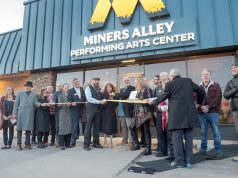The selection-by-lottery format of the Boulder International Fringe Festival ensures a healthy diversity of performers each year, but there are still repeat artists from year to year.
Gemma Wilcox, a 34-year-old British expat who produces, directs and acts in one-woman shows, is one of those Fringe Fest regulars. She won the “Best of Fest” award in 2005, 2006 and 2008, and she’s back this year with a one-woman show called The Magical Mystery Detour, which she co-wrote with director Elizabeth Baron.
Wilcox’s character, Solandra, gets a letter from her mother’s lawyer telling her that one of her mother’s final wishes was that her daughter witness the transit of Venus in England, so Solandra drops everything and travels overseas. To act out the journey, Wilcox takes on the personas of 21 characters, including men, women, animals and inanimate objects.
“[The play explores] how we deal with the apparent ‘detours’ in life and relationships, especially when it’s different than or goes against the pictures we have or our expectations, dreams, etc.,” Wilcox says.
Wilcox doesn’t collaborate on her one-woman plays often, but she speaks enthusiastically about her work with Baron.
“I would say that in the past, I’ve done more of the writing myself. … I’d say this is more collaborative than usual in my one-woman shows,” Wilcox says. “Sometimes we’ll just have the same thought or think of the exact same line. It’s really special. For many years I was looking for a creative partner, someone I could trust, because many of my plays are really vulnerable.”
Wilcox is not alone in doing solo acts at the Fringe Festival. At least nine acts feature just one performer, and many more acts feature fewer than five. The rules of the Fringe Festival encourage this. Artists must pay for all production costs associated with their act, and they pocket 100 percent of the ticket proceeds. However, another rule dictates that ticket prices be kept low. The combination of those two rules encourages acts without much overhead or actors, encouraging performers to strip down their performances.
Wilcox’s play is about as stripped down as you can get, with no costume changes, no other actors and a minimal set. It’s “raw theater,” as she calls it, and she hopes to take it to other festivals across the country after the Boulder Fringe Festival ends. (She’s sort of a regular on the “fringe circuit”; she says she spends about three to four months on the road in a good year.)
Wilcox says Solandra’s experiences are based on her own life, which turns collaboration into a potentially precarious process. (Solandra is a recurring character in Wilcox’s plays, but she says The Magical Mystery Detour will stand on its own.) She and Baron wrote the play in a three-week blitz, and emotions sometimes ran high.
“[Baron] and I have certainly been laughing and crying quite a bit — and sometimes simultaneously — during our rehearsals,” Wilcox says.
But getting to that vulnerable emotional core is what makes good theater, she says. That’s the ultimate goal.
“Basically, the theatre work that I love and the teachers in the arts that I have been drawn to embrace the entire human being, in all its light and shadow, joy and pain,” she says. “And often the best material comes from the most vulnerable places where things are raw.”
Respond: [email protected]














